

|
Back to |
| The Front Page |
| Archives |

|
Down There On a Visit -- Croquet in Pocahontas and Strong River Farm by Bob Alman Posted December 20, 1997
|
I left my native Mississippi in my youth, before civil rights had come to the Deep South, before four-lane highways had suburbanized a mostly rural state, before television had substantially "Americanized" a region whose people had once seen themselves as fundamentally apart from the American mainstream.
In the early sixties, the Mississippi of the 90's would have been unimaginable. Except for the paper pulp pine forest that rolls across the gentle hills stretching all the way from Louisiana to Alabama in Central Mississippi, this looks like Anyplace, U.S.A. - the same malls, the same interstates, the same franchises, the same values.. and, increasingly for the younger generations, even the same accents.
But for me, the change that is most emblematic of a sweepingly new and different Deep South is not the interstates, nor the civil rights, nor the thoroughly homogenous suburban culture. It's simply this: They've got real croquet clubs in Mississippi!
Yes, I know the early growth of the sport was sponsored largely by Southerners, but they were in the wealthy retirement communities of Florida and along the Eastern Seaboard, all the way up through North Carolina and Virginia - not in the rural, piney-woods South I knew; not in the Mississippi perenially competing with Arkansas for last place in almost every quality-of-life measurement, from personal income to infant mortality. And yes, I had heard vague reports of some croquet clubs in The Magnolia State, but it wasn't until a Jackson, Mississippi attorney named Butch Cothren visited the San Francisco Croquet Club and invited me to reciprocate that the realization began to dawn: These guys are serious!
A Half Hour North of the State Capitol:
The Pocahontas Mallet Club
So on my next visit to Mississippi - Thanksgiving week - I determined to make
a personal investigation. It was to start with Butch Cothren's club. He
arranged a rendezvous with another club member, Bill Aden, who guided me over
a web of suburban roads about 30 minutes north of Jackson to a place called
Pocahontas. There, on the 300-acre estate of Mike and Laurie McRee, I found
not one, but TWO worldclass croquet lawns and all the trimmings.
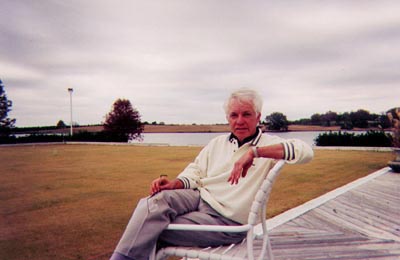
|
| Bill Aden shows off the lighted Court #1 at the Pocahontas Mallet Club. |
The trimmings included a big main house, sparkling lakes, rolling pasturelands, and thoroughbred horses. But the main attraction was Croquet Lawn #1, built in 1990, set like a jewel on a peninsula near the main house, surrounded by lighting standards that make croquet actually possible in the semi-tropic, humid heat of midsummer.
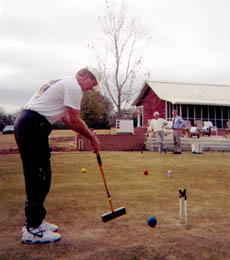 Whites are optional on midweek afternoons for escapees from Jackson office
buildings who warm up on Court #2 in front of the clubhouse.
Whites are optional on midweek afternoons for escapees from Jackson office
buildings who warm up on Court #2 in front of the clubhouse.
|
The second lawn turned out to be almost identical to the first, except that it fronted on a fully appointed guest house that had now become the croquet clubhouse. When we arrived it was early afternoon before the holiday, and.some hardcore croquet players were already there warming up. They had heard that a "hotshot" Californian was coming to play croquet. They were all men, and they were all, I gather, fairly well-to-do: doctors, lawyers, real estate developers, financiers. They often played in the mid to late afternoon on weekdays. Sundays were reserved for more social play, often with their wives. About16 couples were members of the club, and 10 couples played frequently.
I proposed a warm-up game of USCA golf croquet and was surprised to learn they didn't know the rules. In my self-appointed missionary role, I suggested that the game would be very good for their Sunday social affairs. We played two spirited games, then switched to the big game. The wickets were wide-set (about an eight of an inch clearance) and unaccountably, I was struck by a bad case of "wicketitis." These guys were playing intensely and well, and I had given away a four-ball break to Bill Aden - a 6 handicap player behaving more like a 2 handicap.
But I was saved from humiliation by the much heralded arrival of one of their two highest ranked players - Dan Hise, a 4 handicap. (The 3 1/2 handicap, club founder Mike McRee, wasn't available.) Everyone agreed that we two should play singles. I was to be given a chance to redeem myself, but the pressure was on. I gained a slight midgame advantage and managed to grind my opponent to a halt several times with successful boundary attacks. In last turns, Dan needed a good corner-to-corner boundary attack to get ahead. He went out by inches. I breathed a sigh of relief and shook Dan's hand. "I was lucky," I said, and it was true - but I said it in a way that sounded merely gracious. I had a reputation to uphold, after all, as a visiting Western hot-shot.
South of Jackson: Strong River Ranch
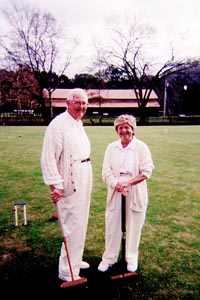 Croquet is merely the latest enhancement Guy and Tay Gillespie have brought
to a rambling rural retreat where they live, practice organic farming, and
run a popular summer camp for children.
Croquet is merely the latest enhancement Guy and Tay Gillespie have brought
to a rambling rural retreat where they live, practice organic farming, and
run a popular summer camp for children.
|
Tay is especially proud of her Strong River Camp, which takes care of more than 100 kids at one time for two months in the summer in programs of various duration. "I don't advertise at all," she announces, "and I already have 260 on my waiting list for next summer."
Tay had been properly unimpressed by my WorldWideWeb credentials. The Gillespies are not online, and she never heard of the USCA Website or CROQUET WORLD ONLINE MAGAZINE, and in fact, their lawn is less than a year old. But that doesn't mean they've been out of the loop. World Champion Robert Fulford has been there to demonstrate top-level croquet. "We're not trying to be the best players in the country," she says. "We just want to play good, social croquet with friends and family."
Nevertheless, the Gillespies are fond of bringing in the pro's, inviting a lot of friends, and treating them to the spectacle of championship croquet on the Strong River court. "Sometimes they're mystified, like when they see the players just shooting to the boundaries in opposite corners," she admitted, "but I still think it's a good way to introduce people to the game."
After a truly sumptuous lunch - topped off by a choice of cheesecake, pecan pie, and chocolate cake with ice cream - it was time for croquet. Dr. Gillespie had just finished mowing the lawn with his Jacobson. They had overseeded the dormant Bermuda grass with winter rye, which had not yet come in fully, so the surface was still a bit uneven.
I needed an excuse, as it turned out. I was not surprised to learn that they did not know the correct, updated rules of USCA golf croquet, and I made my standard offer for a warmup game. Several younger family members were in the group as novices, so the "big game" would be too unmanageable. I took a weak partner, the Gillespies proved to be excellent students of the game they said they didn't know, and I was beaten twice before we ever got around to serious croquet.
And even then, I found that my "wicketitis" had persisted. I gave Dr. Gillespie a four-ball break which he took all the way around before I managed to put together one for myself. But by then, it was time to say goodbye.
I asked about the youngsters who came to the summer camps - do they play croquet? "Oh, yes," Tay replied. "They play a lot of 9-wicket croquet, but not on the good lawn, unless they're very, very good. And we teach the teenage counselors to play, too, on the big court. Some of them learn the game very quickly ."
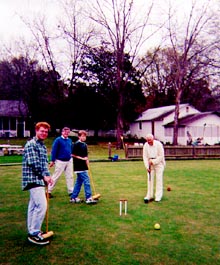 As often as not, croquet beside the Strong River is a family affair.
As often as not, croquet beside the Strong River is a family affair.
|
All that could happen in Mississippi. I can even envision a two-week "croquet camp" for gifted teenagers at Strong River Ranch - an intensive course mirroring the secondary school programs of the Brits which produced the generation of English champions now in their late 20's. (If she set her mind to it, Tay Gillespie could do it.)
Croquet - the sport - has taken root in Mississippi, and where it will flower next in the state, no one knows. As a Mississippi ex-patriot, I'll be watching for developments. In the meantime, the fine lawns, excellent croquet, and the even finer hospitality of these frontier croquet players have given me a perfect excuse for visiting my home state again soon, and often.
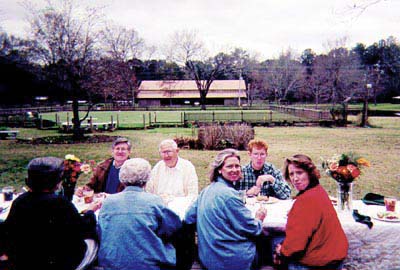
Southern hospitality on a warm winter day calls for a multi-course outdoor luncheon overlooking the croquet lawn and red-roofed barn. |